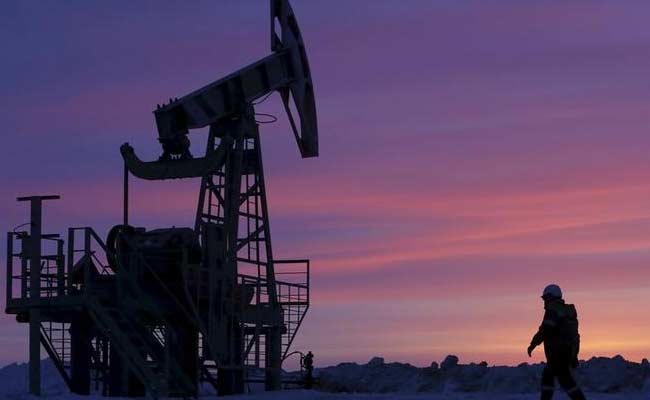Oil Steadies As Investors Question Reserve Release

Oil prices were largely steady on Wednesday as investors questioned the effectiveness of a U.S.-led release of oil from strategic reserves and turned their focus to how producers will respond. Brent crude settled down 6 cents, or 0.07%, at $82.25 a barrel, while U.S. West Texas Intermediate (WTI) crude futures were down 11 cents, or 0.14%, at $78.39.
The United States said it would release millions of barrels of oil from strategic reserves in coordination with China, India, South Korea, Japan and Britain to try to cool prices after OPEC+ ignored calls to pump more.
Japan will release "a few hundred thousand kilolitres" of oil from its national reserve, but timing has not been decided, its industry minister Koichi Hagiuda said on Wednesday.
Some countries have not taken a helpful position in terms of oil and gas prices, the head of the International Energy Agency said on Wednesday, saying not enough supply was reaching consumers.
Analysts said the effect on prices was likely to be short-lived after years of declining investment and a strong global recovery from the COVID-19 pandemic.
The coordinated release could add about 70 million to 80 million barrels of crude supply, smaller than the more than 100 million barrels the market has been pricing in, analysts at Goldman Sachs said.
"On our pricing model, such a release would be worth less than $2 a barrel, significantly less than the $8 a barrel sell-off that occurred since late October," the bank said in a note titled "a drop in the ocean".

U.S. crude stocks in the Strategic Petroleum Reserve fell last week to 604.5 million barrels, their lowest since June 2003.
JPMorgan Global Commodities Research said any impact on oil prices from the release of crude may not be sustained for long. The brokerage also expects global oil demand to surpass 2019 levels by March 2022.
While attention has now switched to how the Organization of the Petroleum Exporting Countries and its allies will react to the joint reserve release, sources said the group was not discussing pausing oil output increases for now.
The group is to hold two meetings next week to set policy, sources said.
Jeffrey Halley, senior market analyst at OANDA, said the move to tap storage was "a one-shot wonder and markets responded appropriately".
U.S. crude stockpiles rose 1 million barrels last week, the Energy Information Administration said, compared with analysts' expectations for a decrease of 481,000 barrels.
U.S. crude stocks in the Strategic Petroleum Reserve fell last week to 604.5 million barrels, their lowest since June 2003.
"While crude oil inventories built by 1 million barrels, crude oil inventories in the Strategic Petroleum Reserve dropped by 1.6 million barrels and along with continued declines in product inventories, I think this is supportive for prices," Andrew Lipow, president of Lipow Oil Associates, said.
The number of active U.S. oil rigs rose by six to 467 this week, the highest since April 2020, as higher crude prices have prompted some drillers to return to the wellpad.
Prices were also tempered by coronavirus infections that broke records in parts of Europe, prompting new curbs on movement.
Latest News
 car&bike Team | Feb 12, 20262026 MG Majestor SUV: In PicturesAlong with the new positioning, the SUV features a heavily updated design and styling; here’s a detailed look at it in pictures.1 min read
car&bike Team | Feb 12, 20262026 MG Majestor SUV: In PicturesAlong with the new positioning, the SUV features a heavily updated design and styling; here’s a detailed look at it in pictures.1 min read car&bike Team | Feb 12, 2026Tata Punch EV Facelift Spotted Ahead Of February 20 LaunchThe Punch EV facelift appears to be identical to the ICE counterpart.4 mins read
car&bike Team | Feb 12, 2026Tata Punch EV Facelift Spotted Ahead Of February 20 LaunchThe Punch EV facelift appears to be identical to the ICE counterpart.4 mins read Amaan Ahmed | Feb 12, 2026MG Majestor SUV Unveiled In India Ahead Of April 2026 LaunchReplacing the Gloster in the lineup, the Majestor will be the new MG flagship SUV in India, and deliveries will begin in the month of May.1 min read
Amaan Ahmed | Feb 12, 2026MG Majestor SUV Unveiled In India Ahead Of April 2026 LaunchReplacing the Gloster in the lineup, the Majestor will be the new MG flagship SUV in India, and deliveries will begin in the month of May.1 min read Jaiveer Mehra | Feb 12, 2026Mahindra Eyes Increasing Production Capacity Of ICE & Electric SUVs By Up To 7,000 Units Per Month By Q2 FY2027Carmaker said that currently models such as the Bolero, Bolero Neo and XUV 3XO are being manufactured at peak capacity.3 mins read
Jaiveer Mehra | Feb 12, 2026Mahindra Eyes Increasing Production Capacity Of ICE & Electric SUVs By Up To 7,000 Units Per Month By Q2 FY2027Carmaker said that currently models such as the Bolero, Bolero Neo and XUV 3XO are being manufactured at peak capacity.3 mins read Carandbike Team | Feb 11, 2026MG Majestor India Launch Today: What To Expect?Essentially an updated version of the MG Gloster, the new Majestor will be positioned as a more premium derivative, taking on rivals like the Toyota Fortuner.3 mins read
Carandbike Team | Feb 11, 2026MG Majestor India Launch Today: What To Expect?Essentially an updated version of the MG Gloster, the new Majestor will be positioned as a more premium derivative, taking on rivals like the Toyota Fortuner.3 mins read car&bike Team | Feb 12, 2026End Of The Road For Diesel Vehicles? Niti Aayog Pushes For Adoption Of Cleaner FuelsIn its latest report, Niti Aayog has advocated the use of cleaner fuels like CNG while doing a gradual phase out of Diesel technology1 min read
car&bike Team | Feb 12, 2026End Of The Road For Diesel Vehicles? Niti Aayog Pushes For Adoption Of Cleaner FuelsIn its latest report, Niti Aayog has advocated the use of cleaner fuels like CNG while doing a gradual phase out of Diesel technology1 min read
 Bilal Firfiray | Feb 12, 2026BMW X3 30 xDrive M Sport Review: The Driver’s SUV ReturnsRange-toppingX3 30 xDrive M Sport brings back the fun with 255bhp and genuine enthusiast appeal. Does this performance-focused SUV stand out?5 mins read
Bilal Firfiray | Feb 12, 2026BMW X3 30 xDrive M Sport Review: The Driver’s SUV ReturnsRange-toppingX3 30 xDrive M Sport brings back the fun with 255bhp and genuine enthusiast appeal. Does this performance-focused SUV stand out?5 mins read Bilal Firfiray | Feb 11, 2026Mercedes-AMG CLE 53 Coupe Review: The Goldilocks AMG?The Mercedes-AMG CLE 53 Coupe is a concoction of hooliganistic performance and everyday usability. Here’s why this Rs 1.5 crore two-door AMG might be the perfect modern sports coupe for India.6 mins read
Bilal Firfiray | Feb 11, 2026Mercedes-AMG CLE 53 Coupe Review: The Goldilocks AMG?The Mercedes-AMG CLE 53 Coupe is a concoction of hooliganistic performance and everyday usability. Here’s why this Rs 1.5 crore two-door AMG might be the perfect modern sports coupe for India.6 mins read Girish Karkera | Feb 11, 2026Toyota Ebella EV Review: Compact And Fun-To-Drive With The Promise Of Stress-Free AftersalesNo hiding the fact that it is a clone of the Maruti Suzuki eVitara, but the first all-electric Toyota in India is reasonably well-rounded8 mins read
Girish Karkera | Feb 11, 2026Toyota Ebella EV Review: Compact And Fun-To-Drive With The Promise Of Stress-Free AftersalesNo hiding the fact that it is a clone of the Maruti Suzuki eVitara, but the first all-electric Toyota in India is reasonably well-rounded8 mins read Bilal Firfiray | Feb 10, 2026Tata Punch EV Long Term Review: Small EV With A Big-Hearted PersonalityWith the new Punch EV Facelift just around the corner, we decided to take a look at what it excels at and what could be improved.7 mins read
Bilal Firfiray | Feb 10, 2026Tata Punch EV Long Term Review: Small EV With A Big-Hearted PersonalityWith the new Punch EV Facelift just around the corner, we decided to take a look at what it excels at and what could be improved.7 mins read Bilal Firfiray | Feb 4, 2026Volkswagen Tayron R-Line Review: Sensible Flagship For IndiaVolkswagen has introduced a made-in-India flagship SUV that offers space, comfort, performance, and German driving finesse in a practical three-row package. But is the Tayron R-Line good enough?6 mins read
Bilal Firfiray | Feb 4, 2026Volkswagen Tayron R-Line Review: Sensible Flagship For IndiaVolkswagen has introduced a made-in-India flagship SUV that offers space, comfort, performance, and German driving finesse in a practical three-row package. But is the Tayron R-Line good enough?6 mins read



























































































































